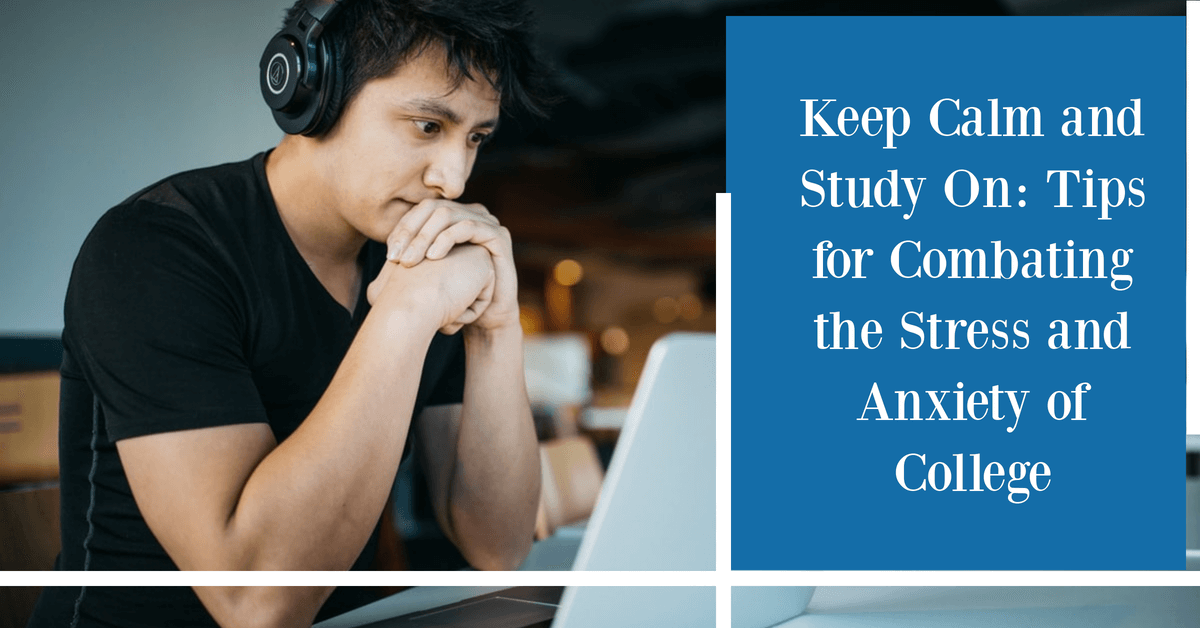Keep Calm and Study On: Tips for Combating the Stress and Anxiety of College
 Many college students suffer from stress and/or anxiety. They may find their classes move too fast, or they struggle to balance studying with socializing. Regardless of the reasons behind your stress, you can reduce it through the following techniques.
Many college students suffer from stress and/or anxiety. They may find their classes move too fast, or they struggle to balance studying with socializing. Regardless of the reasons behind your stress, you can reduce it through the following techniques.
Seek Counseling
When stress and anxiety become overwhelming, interfere with your daily life or impede your studies, you should seek counseling. Therapists help people cope with stress, anxiety and life transitions. They don’t just provide treatment to people who have mental disorders.
When emotional struggles are ignored, they can turn into a mental disorder, which is another reason why it’s important to seek counseling during times of need. A therapist will teach you coping mechanisms to help you minimize your discomfort, do what needs to get done and improve your life. They can help you heal from past events that have contributed to your current struggles. A therapist can even assist you in goal setting and achievement.
Make Time for Fun Activities
Are you studying without giving yourself time for fun activities? This has a negative effect on how you feel and can lead to burnout. Making time for fun activities is necessary for good mental health. If you feel like you don’t have time for fun, take a hard look at your schedule. Are you overcommitting? You may have to stop doing as many favors for others in order to take care of yourself. Another option to free up time is setting time limits on how long you study.
Colleges have fun activities you can get involved with on campus, so you don’t need to travel far or spend a lot of money. Examples include yoga, arts and crafts, games, holiday decorating and eating delicious foods. If you want to do something off-campus, you can find activities that offer student discounts. Plenty of events are also free or low cost to attend.
Be careful about parties because you are at a higher risk of becoming addicted to alcohol and other drugs when you are stressed out, anxious, or experiencing another negative emotion. You should only drink alcohol when you’re in a good mood and in moderation.
Look into Getting an ESA
Emotional support animals can help you deal with stress and anxiety. An emotional support animal gives your mind something else to focus on when symptoms of anxiety or stress begin. This distraction often prevents you from being overcome with anxiety and stress. Physical contact between you and the animal builds a bond and can help you feel better too. However, you need to do your research. Some dogs can quickly become a messy handful and will increase your stress and anxiety. Boston Terriers have lower shedding levels and create fewer allergens if you’re concerned about allergies.
Sleep Well
One of the best things you can do for your overall health is to get enough sleep every night. It’s crucial for both your physical and mental health. Your cognition and emotion regulation are impaired when you don’t sleep enough at night. Think of what a suitable bedtime would be, and get into the habit of going to bed and waking up at the same time every day even on the weekends. This prevents insomnia.
Make sure you sleep seven to nine hours a night if you’re an adult. Use blue light filters on your electronic devices at night because blue light interferes with your ability to fall asleep quickly. Meditating for 10 minutes before bed is also helpful for sleeping better. It releases stress from the day and relaxes your body.
Look Up How to Learn Faster
If you’re stressed out about not learning the material fast enough, research techniques on how to learn faster and study more efficiently. Handwriting your notes helps you retain the material faster than typing does. If you prefer typing notes in class, you can hand write them in your own words later. Also, pretend like you are teaching the information to someone else when you’re studying. This is another tactic for learning faster.
Stay Organized
A lack of organization causes and contributes to stress. You’ll find yourself feeling calmer, more productive and more in control of your life once you become organized. Similar to improving your learning skills, you can find information on how to stay organized. There are many easy tips that make your life easier. It just takes some research to discover them. Color-coding and using a planner are effective organization techniques. Also, get into the habit of putting things back where you got them and cleaning messes as they happen. This prevents clutter and the need to use a lot of arm power to clean tough stains.
Minimizing stress and anxiety during college involves staying organized, getting enough sleep every night and seeking counseling when needed. Sometimes, you can overcome the stress by implementing the tips you’ve found online. When those don’t work sufficiently for you, that’s when you know for sure that counseling is needed.
Concerned about your safety as a student? Click here to learn some vital safety tips!

